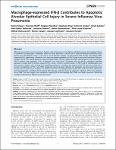Macrophage-expressed IFN-β Contributes to Apoptotic Alveolar Epithelial Cell Injury in Severe Influenza Virus Pneumonia
Högner, Katrin
Wolff, Thorsten
Pleschka, Stephan
Plog, Stephanie
Gruber, Achim D.
Kalinke, Ulrich
Walmrath, Hans-Dieter
Bodner, Johannes
Gattenlöhner, Stefan
Lewe-Schlosser, Peter
Matrosovich, Mikhail
Seeger, Werner
Lohmeyer, Jürgen
Herold, Susanne
Influenza viruses (IV) cause pneumonia in humans with progression to lung failure and fatal outcome. Dysregulated release of cytokines including type I interferons (IFNs) has been attributed a crucial role in immune-mediated pulmonary injury during severe IV infection. Using ex vivo and in vivo IV infection models, we demonstrate that alveolar macrophage (AM)-expressed IFN-β significantly contributes to IV-induced alveolar epithelial cell (AEC) injury by autocrine induction of the pro-apoptotic factor TNF-related apoptosis-inducing ligand (TRAIL). Of note, TRAIL was highly upregulated in and released from AM of patients with pandemic H1N1 IV-induced acute lung injury. Elucidating the cell-specific underlying signalling pathways revealed that IV infection induced IFN-β release in AM in a protein kinase R- (PKR-) and NF-κB-dependent way. Bone marrow chimeric mice lacking these signalling mediators in resident and lung-recruited AM and mice subjected to alveolar neutralization of IFN-β and TRAIL displayed reduced alveolar epithelial cell apoptosis and attenuated lung injury during severe IV pneumonia. Together, we demonstrate that macrophage-released type I IFNs, apart from their well-known anti-viral properties, contribute to IV-induced AEC damage and lung injury by autocrine induction of the pro-apoptotic factor TRAIL. Our data suggest that therapeutic targeting of the macrophage IFN-β-TRAIL axis might represent a promising strategy to attenuate IV-induced acute lung injury.
Dateien zu dieser Publikation
Keine Lizenzangabe
Verwandte Publikationen
Anzeige der Publikationen mit ähnlichem Titel, Autor, Urheber und Thema.
-
2011-10-12ZeitschriftenartikelNo Detection of XMRV in Blood Samples and Tissue Sections from Prostate Cancer Patients in Northern Europe. Stieler, Kristin; Schindler, Sarah; Schlomm, Thorsten; Hohn, Oliver; Bannert, Norbert; Simon, Ronald; Minner, Sarah; Schindler, Michael; Fischer, NicoleBackground: We recently published the rare detection of xenotropic murine leukemia virus-related virus (XMRV) (1/105) in prostate cancer (PCA) tissue of patients in Northern Europe by PCR. The controversial discussion ...
-
2013-04-15ZeitschriftenartikelGiardia duodenalis arginine deiminase modulates the phenotype and cytokine secretion of human dendritic cells by depletion of arginine and formation of ammonia Banik, Stefanie; Viveros, Pablo Renner; Seeber, Frank; Klotz, Christian; Ignatius, Ralf; Aebischer, ToniDepletion of arginine is a recognized strategy that pathogens use to evade immune effector mechanisms. Depletion depends on microbial enzymes such as arginases, which are considered virulence factors. The effect is mostly ...
-
2010-05-01ZeitschriftenartikelDifferential expression of human endogenous retrovirus K transcripts in primary human melanocytes and melanoma cell lines after UV irradiation. Reiche, Janine; Pauli, Georg; Ellerbrok, HeinzHuman endogenous retroviruses (HERVs) are discussed as causative agents of various diseases including cancers. Expression of endogenous retroviral sequences can be induced by ultraviolet (UV) light, which is also considered ...

